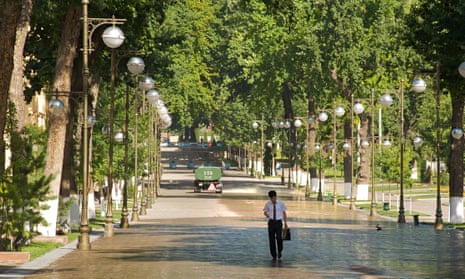There is one word on everyone’s lips in Uzbekistan these days: change.
“Things are changing, life is getting better!” enthused Akrom Abdurahimov, a 20-something resident of Tashkent, the capital of this central Asian state.
“Every day you wake up and something is different,” said Nodira Ilhamova, a young professional sipping tea on the terrace of a trendy cafe in the September sunshine.
“We’ve seen so many changes in the country in the past year,” said Pulat Ibrahimov, a middle-aged businessman lunching in a lively restaurant packed with office workers.
There is also one name that keeps recurring: Shavkat Mirziyoyev, the president. Mention him and you’re as likely as not to get a big thumbs-up.
Since Mirziyoyev came to power a year ago following the death of his Soviet-era predecessor Islam Karimov, one of the world’s most severe dictatorships has lightened up - though not enough for true openness (interviewees’ names have still to be changed to protect identities).
Mirziyoyev, a greying 60-year-old who was Karimov’s prime minister for 13 years, is an unlikely poster boy for dynamic transformation, but he has embraced some eye-catching reforms.
He has released some political prisoners, welcomed international human rights campaigners who were persona non grata for years, loosened the screws on the media and recalled thousands of people forced to go and picked cotton instead of doing their regular jobs. Most radically, he has pledged to listen to, and govern for, the people.
The change sweeping through this country of 34 million people who lived under political repression and economic stagnation for 27 years of Karimov’s rule has sparked excited chatter about a political thaw. Is there an “Uzbek spring” in the air? Is Mirziyoyev really bringing democracy to totalitarian Uzbekistan?
People power?
Mirziyoyev says he is. He intends “to build a democratic state and a just society”, he declared recently, making the case that he is transforming Uzbekistan, a land of mountains, deserts and ancient Silk Road cities once ruled by despotic Islamic emirs, Russian tsars and Soviet communists, into a democracy based on “people’s power”.
Startling words since, under Karimov, Uzbekistan became a byword for despotism, torture and worse. Political and civil liberties were flouted. The media was muzzled. Political and religious dissidents were imprisoned. Labourers were forced into the cotton fields. Anyone who protested risked the fate of demonstrators in the city of Andijan, hundreds of whom were gunned down by security forces in 2005.
“This is a moment of hope for Uzbekistan’s people,” wrote Steve Swerdlow and Hugh Williamson of Human Rights Watch recently, but “it’s time to follow words with action”. They recently visited Uzbekistan, and the sight of Uzbek ministers glad-handing the rights campaigners they recently shunned was an astonishing sign of the changing times.
On the streets of Tashkent, a placid city of generous boulevards, elegant tsarist buildings and grand Stalin-era neoclassical edifices interspersed with drab Soviet tower blocks and the occasional turquoise-domed mausoleum, there is a new spirit of optimism – and plenty of goodwill towards Mirziyoyev.
“He wants to show that with his arrival things are going to be different,” said Ibrahimov. “He’s changing many things because people need it. Businesses need more freedom, which will create more jobs.”
Tashkent was abuzz with talk about the black market – or rather its disappearance. The dodgy dealers who used to hang around Tashkent’s bazaars swapping dollars for wads of Uzbek sum disappeared in early September when Mirziyoyev embraced currency reforms as he ditches the Karimov-era policies that throttled the economy.
This dynamism is creating a feel-good factor, though it has yet to translate into jobs for the legions of unemployed, who drive taxis around Tashkent (going rate for a ride – 40p), hustle for work as day labourers and flock to Russia looking for work.
But political change might take longer than economic liberalisation. “I don’t think that’s going to happen!” said Ibrahimov. “Not within the next five years, or even 10.”
Mirziyoyev was, after all, a loyal foot soldier of Karimov’s repressive regime and came to power in a sham election in which he won 89% of the vote.
“Make no mistake: Mirziyoyev is no democrat. He’s an autocrat in every sense of the word,” Bakhtiyor Nishanov, an analyst from the Washington-based International Republican Institute, said. Mirziyoyev’s priority is economic growth, he said; as for democracy and human rights, he will reform the “bare minimum” to support his ambition of lifting Uzbekistan out of the economic doldrums.
Hence the headline-grabbing initiatives that polish Uzbekistan’s image, such as recalling doctors, teachers and students from the cotton fields; allowing the BBC to reopen its long-shuttered Uzbek bureau; and freeing a handful of the thousands of political prisoners languishing behind bars.
But observers fret that this is mere cosmetic tinkering – and the detention last week of dissident Uzbek writer Nurullo Otahonov as he returned from exile in Turkey, hoping to take advantage of the political thaw, suggests their concern may not be misplaced. Otahonov was released after four days.
In any case, for all the hype about Mirziyoyev and his reforms, some of his people are frustrated by the snail’s pace of political change.
“Things are changing at the top, but it will take a long time to flow down,” said Ilhamova. “It’s good that changes are taking place, but let’s see in 10 years – then we can talk about it. Or maybe 50.”

Comments (…)
Sign in or create your Guardian account to join the discussion